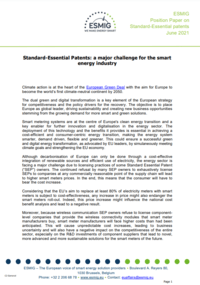Climate action is at the heart of the European Green Deal with the aim for Europe to become the world’s first climate-neutral continent by 2050. The dual green and digital transformation is a key element of the European strategy for competitiveness and the policy drivers for the recovery. The objective is to place Europe as global leader, driving sustainability and creating new business opportunities stemming from the growing demand for more smart and green solutions.
Smart metering systems are at the centre of Europe’s clean energy transition and a key enabler for further innovation and digitalisation in the energy sector. The deployment of this technology and the benefits it provides is essential in achieving a cost-efficient and consumer-centric energy transition, making the energy system smarter, demand driven, flexible and greener. This could ensure a successful green and digital energy transformation, as advocated by EU leaders, by simultaneously meeting climate goals and strengthening the EU economy.
Although decarbonisation of Europe can only be done through a cost-effective integration of renewable sources and efficient use of electricity, the energy sector is facing a major challenge due to licensing practices of some Standard Essential Patent (“SEP”) owners. The continued refusal by many SEP owners to exhaustively license SEPs to companies at any commercially reasonable point of the supply chain will lead to higher smart meters prices. In the end, this means that the consumer will have to bear the cost increase. Considering that the EU’s aim to replace at least 80% of electricity meters with smart meters is subject to cost-effectiveness, any increase in price might also endanger the smart meters roll-out. Indeed, this price increase might influence the national cost benefit analysis and lead to a negative result.
Moreover, because wireless communication SEP owners refuse to license component-level companies that provide the wireless connectivity modules that smart meter manufacturers buy, smart meter manufacturers will face higher costs than had been anticipated. This will cause unpredictable cost increases, leading to business uncertainty and will also have a negative impact on the competitiveness of the entire sector, especially on the R&D investments of component suppliers that lead to novel, more advanced and more sustainable solutions for the smart meters of the future. To address these concerns, and avoid endangering the entire clean energy transition, SEPs in the smart metering sector should be licensed on a fair, reasonable, and non-discriminatory (FRAND)1 basis.
This commitment is intended to:
- ensure that such patent owners receive reasonable compensation for their patented innovations as applied to smart meters/smart grids;
- prevent patent owners from receiving remuneration for innovation that is unrelated to their own innovative efforts; and,
- stop patent owners from refusing licenses to any company willing to negotiate and sign a FRAND license. Moreover, SEP holders should not be able to refuse a FRAND license to patent implementer’s simply because of their position in the product supply chain. Such denial is a violation of the SEP holder’s pledge, specifically the non-discriminatory principle of the FRAND obligation.
Royalties can be paid at any level in the value chain including where the SEPs are actually implemented (i.e., at the chip, component, intermediary device or end product level.) and we do not oppose that. However, the FRAND-based license royalty should only be set based upon the value of the component implementing the SEPs and should not include the value of other components or technologies commonly found in an intermediary or end product, many of which have nothing to do with wireless connectivity.
While it is important to assure a patent holder receives remuneration for the sunk costs of its research that led to the innovation captured in its SEPs and a reasonable profit, it is equally important that a product manufacturer does not pay a royalty based on innovation and implementation that was not contributed by the patent owner.
We urge the European Institutions to take the adequate measures to solve this major issue for the energy sector.
Download our position paper below.
